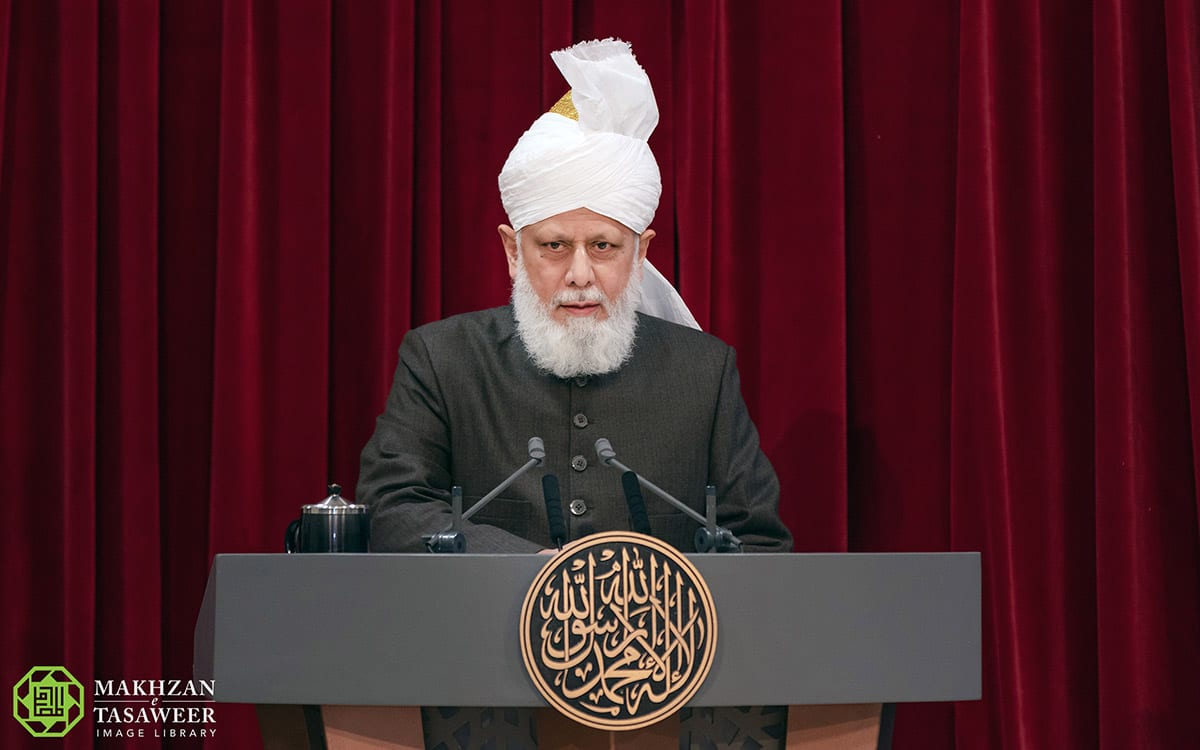Friday Sermon delivered by
Hazrat Mirza Masroor Ahmad(at)
Rightly Guided Caliphs – Hazrat Umar(ra)
After reciting Tashahhud, Ta‘awwuz and Surah al-Fatihah, His Holiness, Hazrat Mirza Masroor Ahmad(aba) said that once, the Second Caliph(ra) said in a sermon regarding Hazrat Umar(ra) that often, in the battles that took place after the demise of the Holy Prophet(sa), there would be a shortage of Muslims in the army.
His Holiness(aba) said that once, Hazrat Abu Ubaidah(ra) wrote to Hazrat Umar(ra) asking for more soldiers, as the enemy’s number was quite high. However there was no one in the surrounding tribes who could join the army, and if there was anyone capable then they were already part of the army. Hence, Hazrat Umar(ra) consulted with various tribes and learned that there was a tribe from which youngsters could be deployed in the army. Thus, Hazrat Umar(ra) informed Hazrat Abu Ubaidah(ra) that he was sending 6,000 more soldiers. 3,000 soldiers would be sent, and then, Amr bin Madi Qarib would be sent, in place and representing 3,000 soldiers. Upon his arrival, the Muslims did not question how one person could be the equivalent of 3,000, instead, they were so overjoyed that they rejoiced and began raising slogans upon his arrival. The opponents saw this jubilation and thought that the Muslims had received reinforcements in the hundreds of thousands. In the end, the Muslims would overcome the opponents.
The March to Egypt
His Holiness(aba) said that he would highlight the conquests of Egypt, one of which was at Farhama. After the conquest of Jerusalem, upon his request, Hazrat Umar(ra) sent Hazrat Amr bin al-Aas(ra) to Farhama with an army of 4,000. Hazrat Umar(ra) had informed him that if he received his letter informing him to return before he reached Egypt, then he should return. However, by the time Hazrat Amr bin al-Aas(ra) received this letter from Hazrat Umar(ra) saying that he should return, he had already reached Egypt and so according to the instructions, he stayed there and went to Farhama. The Muslims laid siege to Farhama and this continued for several months. Finally, one day the army came out to fight and the Muslims defeated them.
The March to Bilbeis
His Holiness(aba) said that after Farhama, Hazrat Amr bin al-Aas(ra) set course for Bilbies. The Byzantine army did not wish for the Muslims to reach there as they wanted to save their Babylonian fortress and so they stopped the Muslims along the way. The Byzantines wished to fight where they had stopped the Muslims, however, Hazrat Amr bin al-Aas(ra) said that they should first at least listen to what they had to say. Thus, Hazrat Amr bin al-Aas(ra) spoke with two representatives from Bilbies and gave them the offer of a treaty wherein the people of Bilbies would be safe and would pay the Jizyah. They asked for a few days to ponder, during which time the Muslims were attacked by the Byzantines and many Muslim lives were lost. Later, however, the Muslims would go on to be victorious. During this conquest, the daughter of Macaucas was captured. Hazrat Amr bin al-Aas(ra) recalled that Macaucas had sent gifts to the Holy Prophet(sa) and so, after consultation, he sent her back to Macaucas along with all of her possessions and workers.
His Holiness(aba) said that after Bilbies, Hazrat Amr bin al-Aas(ra) went to Umdonain. This used to be home to the Babylonian’s largest castle, and was also the capital city for various Pharaohs. Hazrat Amr bin al-Aas(ra) felt that he did not have a large enough army to conquer the castle and so he sent a request for reinforcements. Hazrat Amr bin al-Aas(ra) set out and lay siege to the city and during this time, he learned that Hazrat Umar(ra) was sending 4,000 more Muslim solders to help the army of Hazrat Amr bin al-Aas(ra). Eventually, the Byzantine army came out to fight, and due to a proficient strategy used by the Muslims, they were victorious.
His Holiness(aba) said that after this, the Muslims conquered a place called Foyum, and then Ain al-Shams. Isrib and Manut were then also conquered by the Muslims.
The March to Alexandria
His Holiness(aba) said that then, Hazrat Umar(ra) gave permission for the Muslims to proceed to Alexandria. The Muslims moved forward and were victorious in conquering Alexandria. This was a significant victory, as Alexandria was a central place and one of the most important places for the Byzantines. The siege lasted for nine months. Hazrat Umar(ra) wrote a letter to the army and said that they had taken too long and should plan an attack. Thus, the Muslims attacked and became victorious in Alexandria. Upon hearing of the victory, Hazrat Umar(ra) became very happy. Thus, with the victory at Alexandria, the Muslims effectively conquered all of Egypt. For all those who had been imprisoned by the Muslims, Hazrat Umar(ra) instructed that they could accept Islam, or maintain their religion and pay the Jizyah as well.
The Answer to a Baseless Allegation
His Holiness(aba) said that some Christian historians raise the allegation that during this conquest, Hazrat Umar(ra) instructed for the library in Alexandria to be burned, and that this fire burned for six months. They deduce from this that Muslims oppose knowledge and literature. However, His Holiness(aba) explained that the Holy Prophet(sa) himself encouraged the acquisition of knowledge. Furthermore, His Holiness(aba) explained through various authentic historical accounts that such information saying the Muslims burned down the library is entirely false and fabricated. In fact, as far as authentic historical accounts are concerned, it is clear that the library was burned by Julius Caesar.
His Holiness(aba) said that after Egypt was conquered, Hazrat Amr bin al-Aas(ra) set out for Baraka and Tripoli which the Muslims then conquered. The people agreed to remain there safely and pay the Jizyah.
His Holiness(aba) said that during the era of Hazrat Umar(ra), Islamic rule spread far and wide, affording everyone freedoms, safety and peace. His Holiness(aba) related a quote of the Second Caliph(ra) who said that during the battles and conquests of Hazrat Umar’s(ra) era, the Muslims would regularly offer the pre-dawn optional prayers (tahajjud). He also said regarding the battles of the Rightly Guided Caliphs, that history bears testament to them being wronged, but nowhere in history do we find them ever wronging those same people or taking retribution. Rather upon seeing injustice, they stood up to establish justice, freedoms and rights for all. The Second Caliph(ra) explained that the Rightly Guided Caliphs knew that these things they faced were brought about by God, and that such hardships come about for a believer to become better and increase in their spirituality. Thus, this is something that the Community should remember even today.
Summary prepared by The Review of Religions.

